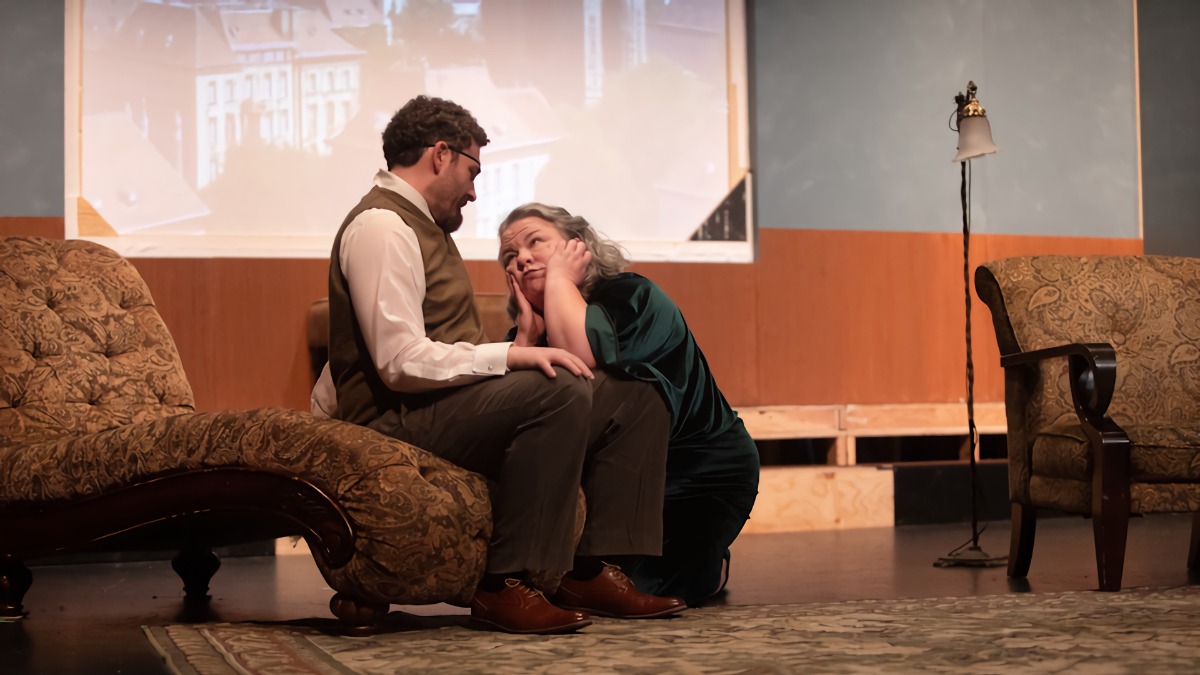A talk with Lauren Love, Director of a Bright Room Called Day
Politics and Theatre have a strange relationship in our country. There’s been a steady effort in the last few decades to make theatre companies and performances more racially and gender-inclusive, but its audiences remain predominantly older, white and middle class —and liberal. While it’s common to go to regional theatre and receive a stirring polemic about social injustice and inequality, it’s rare to find a theatre audience who isn’t already in complete agreement.
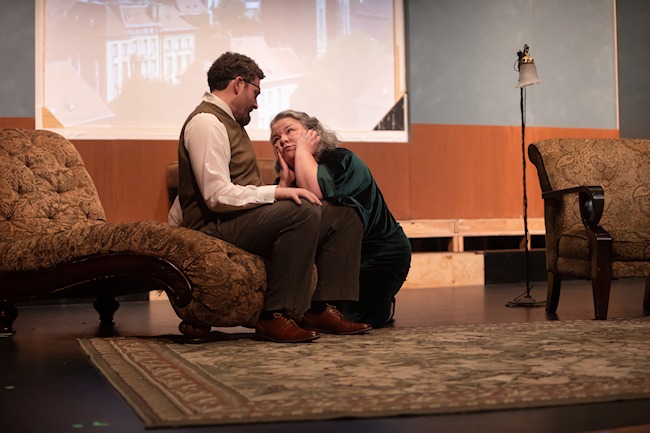
So with very few exceptions, live theatre does little to bridge the gap between left and right in America. And as a result, our theatre seems locked in a crisis of subject matter — political theatre for liberals, and Cats for the new Kennedy Center. How can you change the debate when half the voters are completely uninterested in what you’re saying?
Tony Kushner has never shied away from theatre with a political message, as evidenced by his landmark two-part masterpiece Angels in America. As it turns out, politics was in Kushner’s theatrical DNA beginning with his first play, A Bright Room Called Day, opening this week in a revival by The South Puget Sound Community College Theatre Collective.
First staged in 1987, the play follows a group of artists and bohemians in Berlin during the years the Nazis rose to power, with a look at how the pressures of their changing society causes them to shift their lives and attitudes. Between their story and the audience is another character, Zillah, who speaks from the viewpoint of the play’s “present,” where she traces links between not just conservative thought and authoritarianism but Ronald Reagan and Adolf Hitler — a comparison that made the play a bit of a hot potato for more than a decade.
(Interestingly enough, it made it a hot commodity after Trump’s first election in 2016 — so much that Kushner went on to write a new version in 2018, A Bright Room Called Day, (Revised). In this version, a second narrator in the present argues with the first narrator, and discusses if it’s valid to compare Trump to Hitler … proving that Kushner has lost none of his firebrand instincts.)
But all the “Trump is like HItler” chatter on the Left hasn’t slowed the President’s trajectory of power. So what is the purpose of doing political theatre when it seems unlikely to change anyone’s mind?
We spoke with the play’s director and head of the College’s Drama Department, Lauren Love, about this and other issues.
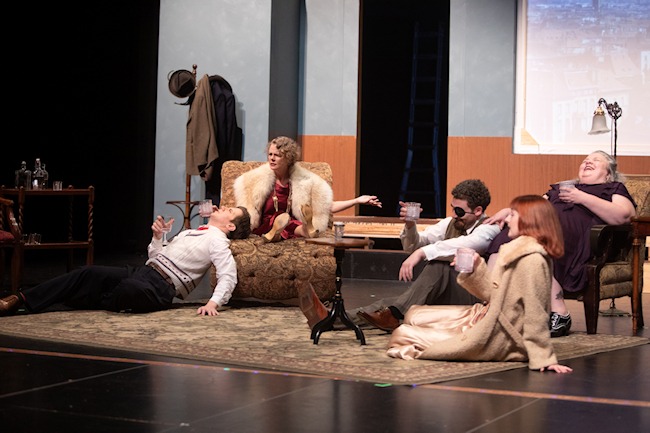
(Our conversation below was edited and condensed for clarity.)
What brought you to this play?
It spoke to our contemporary moment for me, of course. I think we all feel that. And I like theatre that resonates, that creates a public forum that allows us to reflect and make the analogies between who we were and who we are, and the decisions we have to make in our lives.
Like Angels in America, this is a big, ambitious play with a significant run time and a large cast. SPSCC tends to have an extended rehearsal period for their shows….
Five or six weeks.
Right, instead of three or four you’d have in most professional productions. Does this make a community production of something like this possible?
It’s one of the things. We’re also very supported by the College’s administration, and they encourage us to tackle these sorts of pieces. An educational institution should be doing challenging work, because we can take risks that other companies might worry about getting an audience for.
We’re a community college, and we collaborate with the community outside of our students. We have graduating students in the cast, but we also have other performers from the community, people who are contributing to the civic discourse by doing theatre. We see theatre as a civic practice, and we work with people willing to stretch themselves with more interesting roles.
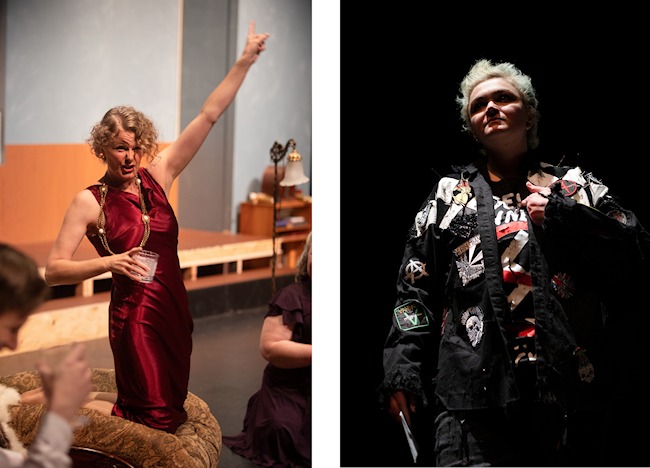
Kushner’s original play debuted in 1987, and the comparison of rising fascism in Germany in the 1930s to Reagan-era politics is explicit in the script. So if we were facing fascism then, why does it look so much more dire now?
There are more signs now that we need to be diligent. In education, our libraries, our policies towards immigrants; in our economy, in our courts; the executive branch and the legislative — in every aspect of our lives there are pressures being put on us, and we need to recognize that, and work to shore up our democracy and the practices, institutions and systems that we care about.
The script was revised in 2018 by Kushner to address some of these questions of relevance. Why did you choose to produce the earlier edition?
It seems to me that having some distance allows us to examine ourselves without reacting too strongly or defensively at the present moment. It reminds me of how in Mother Courage Brecht is talking about Germany at war in 1939 but transposing it into the historical time of the Thirty Years War.
So we can examine where we are, without being triggered by seeing something that might be too close.
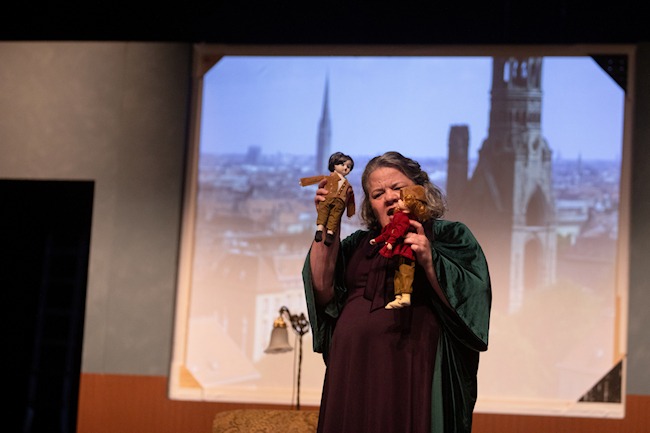
I recall around 2017 Kushner saying he felt the American theatre had failed in making the sort of political change it claimed it could, evidenced by the election of Trump. Now that we’ve got Trump AGAIN, it’s hard to make the argument that political theatre changes minds. Would you like to try?
I think it has the potential to change minds. But I think if we don’t hold fast to these spaces, these public forums, where we can reflect and discuss with who and what we are, we’re closing down another possibility for discourse. Political discourse is valuable, and we’re losing those spaces, our ability to engage in it. That might be why at this moment it seems crucial to pry open the space where we can maybe talk to each other. I think the theatre allows that because it doesn’t put pressure on us to argue, it puts pressure on us to listen. And then maybe we can talk.
There are no shortage of films, plays and books examining the corrupting and awful power of the Nazis and their rise. Why don’t we learn the lesson?
It’s a good question. What I think Kushner does that’s different is showing us ordinary people who have to make choices in difficult circumstances. And we can see that our own practices, the way we’ve ordered our lives, are quite human, and that they’re there to protect our consciences from doubt.
We want our lives, our jobs, our friends, and when those things start to adjust and shift, we don’t want to think that the comfortable and everyday life that we created can be pulled apart.
That’s a unique way to look at this topic in a way that other writers haven’t.
Photos by Sara Gettys
WHAT:
A Bright Room Called Day
WHEN:
7:30 p.m. Friday-Saturday, Nov. 14-15 and 21-22, 2 p.m. Sunday, Nov. 16 and 23.
WHERE:
Kenneth J. Minnaert Center, South Puget Sound Community College, 2011 Mottman Rd SW, Olympia
LEARN MORE:
(360) 753-8586
https://spscc.edu/about/news-awards/spscc-theatre-collective-presents-bright-room-called-day

